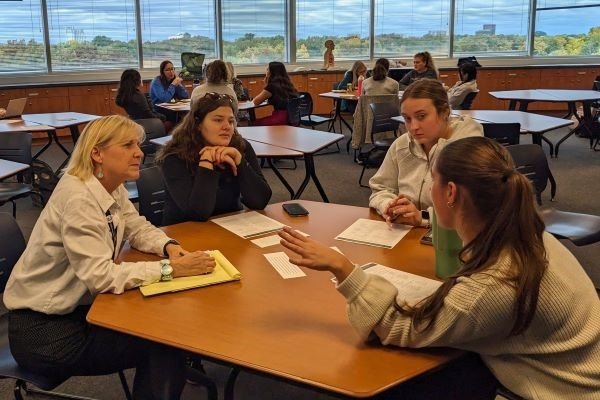Social Injustice Event Shows Speech-Language Pathology Students Mindful Healthcare Practices
Speech-Language Pathology students went over social injustice situations, mindful healthcare
- IL - Downers Grove
Speech-Language Pathology students discussed how to handle various social injustice scenarios and incorporate DEI best practices.
Speech-Language Pathology (SLP) students and faculty gathered on the Downers Grove Campus for an event to discuss scenarios of social injustice in SLP, and the best course of action to take when they occur. This discussion also prepared students to handle unexpected situations in their future careers. Events like these are a part of Midwestern University’s commitment to fostering patient-centered healthcare practitioners.
The attendees were broken into groups and given a few sample situations to discuss. One of the situations centered on the proper protocol if lessons feature holiday themes, but the pediatric client does not celebrate the holiday. Cindy Krizizke, M.S., CCC-SLP, Clinical Assistant Professor, Speech-Language Pathology, said, “We tell the parents in advance this is what our therapy lesson plan is. Let us know if you don’t celebrate and we’ll modify the plan.” Brianna Robertson (SLP ’24) and DEI (Diversity, Equity, and Inclusion) committee chair for the Midwestern University chapter of the National Student Speech Language Hearing Association (NSSLHA) added a suggestion of emphasizing seasons in the lessons instead of particular holidays.
Other sample scenarios included a colleague refusing to take on an autistic graduate student for an externship, addressing people by their preferred pronouns, continuing bilingual speech therapy services, and handling a patient’s relatives who exhibit microaggressive comments, such as criticizing the appearance of the patient.
A presentation was given describing issues of social injustice including systemic discrimination. The importance of SLP providers to being well-versed in these issues was emphasized as the majority of them are female and from dominant cultural backgrounds. The students were given tips on the ways they can be an ally for their patients, including following the proper protocol if they see an injustice. Other topics discussed were white privilege, religious privilege, and able-bodied privilege, along with the focus on diversity, equity, and inclusion (DEI).

Following the presentation and the small group sessions, the students and faculty talked over the scenarios and topics as a large group. Judy Ball, M.S., CCC-SLP, Clinical Associate Professor, Speech-Language Pathology, advised the students to give themselves grace, especially when they are starting out. “In your head, you might be expecting them to answer a certain way.” She added quick flexibility will come with time and experience. Anand Rangarathnam, Ph.D., CCC-SLP, Associate Professor, Speech-Language Pathology advised students not to expect the responses they anticipated to questions. “Be open to whatever they say and follow up,” and he echoed Ms. Ball’s remarks, “We all make mistakes. We’re all not perfect. It’s okay to make a new mistake. Let’s not make the same mistake again.”
Brianna advised the students to reflect on situations they might find themselves in and ask themselves, “How might I be better next time?” or “How can I change?” and think about adapting themselves to the client and their families instead of expecting the opposite. She said the DEI aspect is the inspiration to hold these events, and she hopes the attending students will take away important lessons from this event. “I just hope they can get more experience with DEI related conversations and terminology,” Brianna said.
Brianna shared how these types of events will contribute to her future career as a healthcare professional. “It will teach me to be more open and mindful during conversations with coworkers, supervisors, and potential clients and think outside the box of what I might already have assumed, or what I have already experienced. I will get to problem-solve right then. I will have a toolbox to go back in order to handle it in the best way for all parties included.” She added, “Midwestern University has done well incorporating DEI elements into the classroom.” As far as her career aspirations, Brianna is planning to work in the school system or in pediatric clinics.
The SLP program offers a variety of career options for students, and the curriculum includes DEI aspects as well as ways to address social injustice scenarios to prepare students for their healthcare careers. Midwestern University offers Speech-Language Pathology programs in Downers Grove and Glendale.


